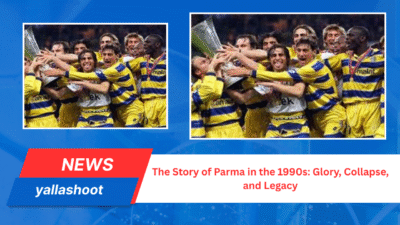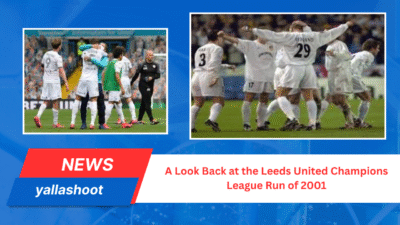European Super League Still Happen—could this bold idea once again reshape the future of European football? Ever since the controversial announcement in 2021, the concept of a breakaway competition has sparked endless debates among clubs, fans, and governing bodies. But the burning question remains: is the dream of a European Super League gone forever, or could it still rise again in the near future? You can explore deeper insights into football’s structure through Genbao Football Base, which showcases how academies contribute to shaping the sport.
The conversation is not only about money or prestige. It touches on identity, tradition, and the balance of power in football. Fans across the continent voiced strong opposition when the project was first unveiled, leading to its collapse within just 48 hours. Yet, with new legal rulings, alternative formats, and renewed ambitions from certain clubs, the idea is far from dead.
If anything, the controversy surrounding the project has opened up broader questions about governance, competitiveness, and the role of fans in shaping the future of the game. Could this mean the European football pyramid as we know it is facing its biggest test yet? Let’s dive deep into the latest updates, challenges, and possibilities.

The Origins of the European Super League
The Initial Proposal of 2021
When twelve of Europe’s wealthiest clubs secretly worked together to launch a new competition, football witnessed one of its most dramatic moments. Their plan was simple: create an elite league outside UEFA’s control, ensuring guaranteed income streams and prestige matches every week.
Immediate Backlash and Collapse
Fans protested, governments condemned the project, and UEFA threatened sanctions. Within two days, most clubs withdrew, and the European Super League seemed to vanish. But in reality, the seeds of change had already been planted.
Legal Challenges and Court Rulings
The Role of A22 Sports Management
A22 Sports Management, the company behind the revived project, continues to lobby for its implementation. They argue that football governance needs reform and that UEFA operates as a monopoly.
European Court of Justice Involvement
The case escalated to the European Court of Justice, which examined whether UEFA’s exclusive control violates competition law. The ruling opened the door for alternative leagues to exist, adding new momentum to the debate.
Could the European Super League Still Happen in 2025?
Why Clubs Remain Interested
Financial inequality across domestic leagues is growing. Smaller clubs struggle, while giants demand more exposure and revenue. This imbalance makes the idea of a closed or semi-closed league appealing for some.
Possible New Formats
A multi-division system with promotion and relegation
Partnerships with national leagues
Expanded access for mid-tier clubs
These proposals attempt to soften earlier criticism, making the concept more fan-friendly and inclusive.
Fan Reaction and Public Sentiment
The Fierce Opposition
Fans across Europe see the Super League as a betrayal of football’s traditions. Stadium protests, banners, and coordinated campaigns forced clubs to withdraw last time.
Shifting Opinions Over Time
However, as financial struggles persist, some fans question whether an alternative structure could improve competitiveness. Younger generations, accustomed to globalized football, may be more open to such a change.
For a perspective on grassroots development that contrasts elite club dominance, check out the Football Academies in Shanghai.
New Proposals on the Table
Rebuilding Trust
To succeed, organizers must engage fans directly, offering transparency and opportunities for input. Without fan trust, no project can survive.
Revenue Sharing Models
Some new blueprints suggest redistributing revenues to smaller clubs to reduce backlash. This approach mirrors other sports leagues worldwide.
Comparison: UEFA Champions League vs. European Super League
| Feature | UEFA Champions League | Proposed European Super League |
|---|---|---|
| Organizer | UEFA | A22 Sports Management |
| Participation | Merit-based | Invitation/semi-closed |
| Revenue Distribution | Wide | Concentrated among elites |
| Fan Reception | Strongly Positive | Mixed to Negative |
| Legal Position | Established Monopoly | Pending Court Approval |
Case Study: How Governance Shapes Football
The battle between UEFA and the Super League mirrors wider debates in sports governance. When one entity controls competitions, it can stabilize the system but risks stifling innovation. When alternatives emerge, competition may improve choices but risks fragmentation.
This is a dilemma not unique to football—it’s a challenge faced in many global industries, as seen with antitrust cases in Wikipedia.
The Role of Governments and Institutions
UK government issued a “fan-led review” promising to safeguard football heritage
European Commission expressed concern about monopolistic control
Domestic leagues warned of disruption to their calendars
A22 Sports Management’s Roadmap
The organization continues to advocate for a Super League, emphasizing:
Innovation in match scheduling
Better financial sustainability for clubs
More global exposure for European football
Yet, the question remains whether these goals align with the interests of fans and players.
The Future of the European Football Pyramid
If a Super League succeeds, national leagues could lose relevance. On the other hand, if reforms within UEFA satisfy elite clubs, the project might never materialize. The balance between tradition and modern business demands will determine the outcome.

Frequently Asked Questions
Q1: What is the European Super League?
It is a proposed competition featuring Europe’s biggest clubs, designed to replace or rival UEFA’s Champions League.
Q2: Why did the original project collapse in 2021?
Due to massive opposition from fans, governments, and football institutions, which pressured clubs to withdraw.
Q3: Could the European Super League Still Happen in the future?
Yes, depending on legal rulings, fan acceptance, and willingness of clubs to push forward.
Q4: Who is behind the revived Super League project?
A22 Sports Management, a company that has filed legal challenges against UEFA’s monopoly.
Q5: How does the Champions League differ from the Super League?
The Champions League is merit-based, while the Super League would involve guaranteed spots for elite clubs.
Conclusion
The European Super League remains one of football’s most controversial ideas. While its first attempt failed spectacularly, legal victories and new proposals keep the project alive. Whether it succeeds depends not only on clubs and organizers but also on the fans who make football what it is.
The debate surrounding the European Super League Still Happen question is not just about football competitions—it is about who controls the future of the game.










